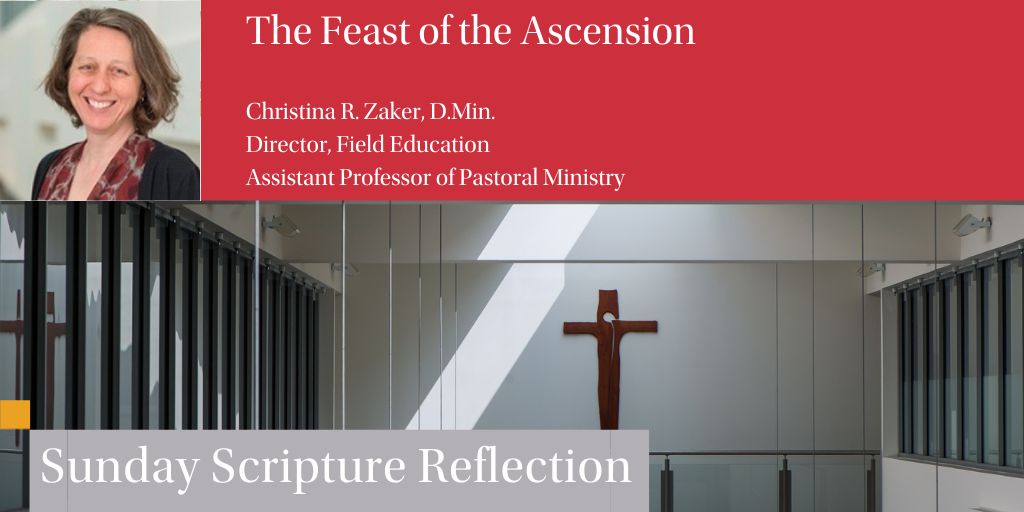
Readings:
Acts 1:1-11
Ephesians 4:1-13
Mark 16:15-20
Blessings on Ascension!
In today’s readings, we see two different versions of the Ascension. In both cases, Jesus appears to his followers after his crucifixion as the Risen Lord; and he engages with them around what they should do next. “You will be my witnesses to the ends of the Earth” is what he says in Acts. “Go into the whole world and proclaim the gospel” Mark’s version states. And after each of those statements he is taken up into the sky.
Jesus’ engagement with his disciples before his ascension takes a different stance in each scripture. In Acts, the disciples have questions for Jesus which indicate that they are still a little unsure of what this all means. In turn they are asked questions by angels wondering, “why are you looking at the sky?” It’s similar to the pedagogical tool of Socratic questions. Sometimes when folks are confused, the best way to map the next steps forward is to ask a couple of good questions to get them thinking differently.
In Mark’s Gospel, just before the section we read today, Jesus rebukes them for their unbelief. Then they are told what to do and they turn around and go do it. That’s another type of pedagogical tool: Reprimand and command. This can get folks thinking differently too, and sometimes it works better than the questions. It all depends on the person and the moment. Discerning the right way to encourage someone is a type of formation. It is the way we help them grow into what they are called to become.
This May, Pope Francis has sent a message of prayer for those in religious life and seminaries, and what he is praying for this month is for their formation – “formation, that leads them to be credible witnesses of the Gospel.” The Pope’s prayer resembles the second reading where in his letter to the Ephesians, Paul talks about the grace that was given to each “to equip the holy ones for the work of ministry.” This grace is built on through formation to help those preparing for ministry to become authentic and credible reflections of God’s love in the world.
Blessings on Mother’s Day too!
Because it is Mother’s Day, I can’t help but also look at these readings through my lens as a woman and mother. I like to ask where we see a mother’s role in these scenes. A little beyond what we read today in Acts, Luke notes that when the disciples gathered, they were joined by others including Jesus’ mother Mary. And I smile as I consider Mary there during the ascension; I can’t help but wonder what she might have been thinking. Did she find herself, asking questions alongside the disciples or did she have a sense of where this was going and found herself prodding this rag tag bunch of folks forward, just as she had her son at the wedding in Cana? In my heart’s musings, I see her like an adept formator. Mothers, like all good teachers and formators, stay a little behind the scenes, helping others to explore their questions and discern actions that align their gifts with God’s Good News. Mothers are supportive, encouraging, sometimes they rebuke but always with an eye toward helping others to thrive. I can picture her there, chuckling to herself – knowing full well that they just might be missing the point of this moment with their eyes on the sky and their jaws hanging open. And she waits, just a little outside of view, knowing the next steps she will take to help them connect the dots.
In our readings today, Jesus (and Mary just out of view) give us a sense of not only what we as individuals are called to do, but also what we as teachers, formators and parents are called to do as well. And so, I invite each of us into a little further reflection on this Ascension Mother’s Day.
How do we participate in the formative mothering of the people of God – not just our own children, not just our own students – but all people who are asked to be credible witnesses of God’s Good News.
What is the credibility of our witness if any of us are just standing around looking up?! What is a word we can share that might bring peace to our world? How do we support ways to both bring hostages home and feed children in Gaza? What are the actions we take to respond to the migrants who stand on our street corners or the students protesting on our campuses? How do we enter conversations where others have been marginalized because of race or gender or religious belief and offer solidarity and support?
Like mothers and formators, we might consider these questions in a manner that Paul reminds us: “With all humility, with gentleness, with patience and …love.” These questions must be asked. It is a pedagogical tool that makes us uncomfortable, rearranges how we see the world and demands that we formulate a response. The prodding comes next – for our students and for ourselves as well. What is my response? What are the ways I am to be a credible witness of hope? What power can I leverage to offer an authentic response to the cries of our world? It is not enough to just think about the questions, we have to get to work. And we have to remember we are not alone, Mark promises “They went forth and preached everywhere, while the Lord worked with them.”
And so I ask: are we still standing here looking at the sky? The world is hurting and needs a mother’s love!
Christina R. Zaker, D.Min.
Director, Field Education
Assistant Professor of Pastoral Ministry
